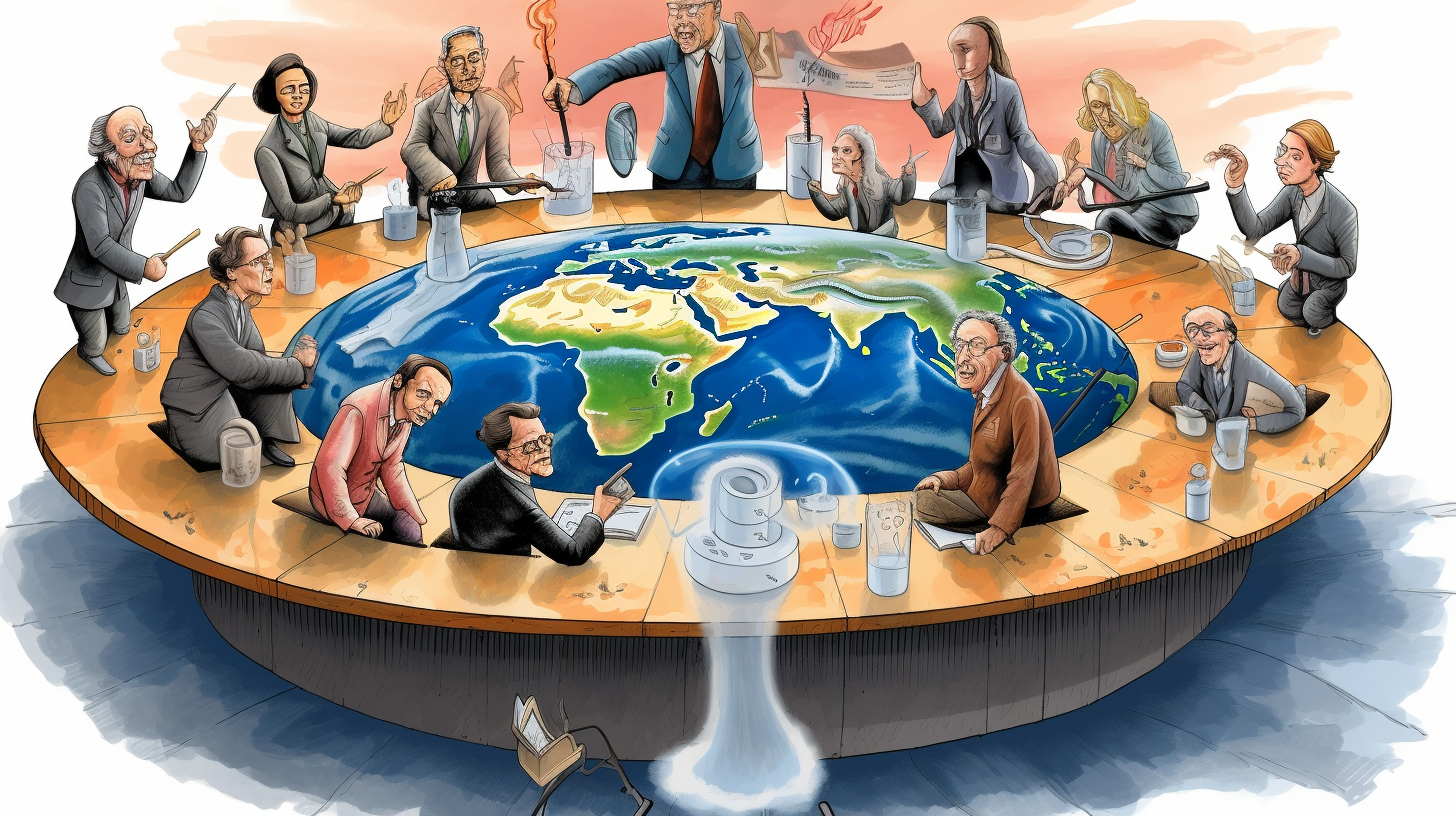https://www.youtube.com/watch?v=HgM1yhwj1mg
Summary
'Dans ce discours prononcé lors de la Dixième Conférence Internationale sur le Changement Climatique en 2015, William Briggs discute de la manière dont les croyances des gens deviennent une partie de leur identité. Il commence par discuter des différences entre les scientifiques et les civils. Si un civil se voit enseigner que la terre tourne autour du soleil, il y croira généralement. Les civils font confiance aux scientifiques, même s'ils ne comprennent pas la mécanique orbitale. Cette croyance est cependant relativement sans importance dans leur vie quotidienne. Il contraste cela avec une croyance que beaucoup de civils ont envers les OVNIs. La plupart des experts ne sont pas d'accord. La différence entre le mouvement planétaire et les OVNIs est que cela est quelque chose qu'ils veulent croire. Cela fait partie de leur identité de croire aux OVNIs. Lorsque les experts argumentent contre les OVNIs, cela peut en réalité renforcer leur croyance. Mais à part ennuyer leurs invités au dîner, c'est toujours une croyance relativement inoffensive. Juste parce que quelqu'un a le désir de croire en quelque chose (que les avions volent ou qu'une pilule guérit une maladie) n'est pas logiquement ou psychologiquement erroné. Les gens croient en ces choses parce qu'ils les ont vues fonctionner. Que les scientifiques soient d'accord est réconfortant, mais pas essentiel. Quand il s'agit de changement climatique, les civils sont souvent en désaccord avec les véritables experts. Et il y a une telle variété d'opinions parmi les experts qu'il est incroyable que quelque chose d'utile puisse être dit sur le changement climatique. Les gens sans compréhension de la science climatique attaquent les scientifiques qui ne sont pas d'accord avec leurs vues. "La solution" au changement climatique implique généralement l'utilisation du pouvoir gouvernemental pour éliminer le "capitalisme sans entraves". Toute activité qui a un impact sur l'environnement devrait être réglementée ou interdite. Les véritables croyants désirent "la solution". Plaider pour cela fait partie de leur identité, donc tout scepticisme à l'égard de la solution est une attaque personnelle contre eux. Ils exigent que les sceptiques de "la solution" soient licenciés, poursuivis en justice, voire tués. Si de nouvelles recherches pourraient ébranler leur croyance, alors les nouvelles recherches doivent être arrêtées. Les politiciens y adhèrent, parce qu'ils se considèrent eux-mêmes comme la solution. Briggs a une expérience personnelle dans ce domaine. Après avoir publié un article critique sur le consensus climatique, il a été menacé par des civils et fait l'objet d'une enquête par des membres de la Chambre et du Sénat. En Union Soviétique, Lysenko a intimidé les autres scientifiques pour qu'ils acceptent ses théories. Les défenseurs de la science "politiquement incorrecte" (le terme réel qu'ils utilisaient) ont été licenciés, arrêtés et même tués. Changer la culture sera difficile. Les gens doivent être convaincus que le gouvernement n'est pas la solution, mais fait partie du problème. Briggs croit que les gens ne sont pas un fléau pour l'environnement, mais un aspect vital de la nature.'
'Dans un discours de 2015, William Briggs a parlé de la manière dont les croyances des gens peuvent devenir une partie de leur identité. Il a affirmé qu'il y a une différence entre les scientifiques et les gens ordinaires. Si un scientifique dit à une personne ordinaire que la Terre tourne autour du soleil, elle le croira généralement. Les gens ordinaires font confiance aux scientifiques, même s'ils ne comprennent pas la science. Mais que l'on croie ou non que la terre tourne autour du soleil ne change pas leur vie quotidienne. Il a comparé cela à certaines personnes qui croient aux OVNI. Ceci est en désaccord avec ce que pensent la plupart des experts. La différence est que certaines personnes veulent croire aux extraterrestres. Croire aux OVNI devient une partie de leur identité. Quand les experts disent que les OVNI ne sont pas réels, cela peut renforcer leur croyance. Ils peuvent être agaçants, mais ces croyances ne sont pas trop nuisibles. Le fait que quelqu'un veuille croire quelque chose ne signifie pas que c'est illogique ou faux. Les gens croient ce qu'ils ont vu. C'est rassurant si les scientifiques sont d'accord, mais ce n'est pas essentiel. Sur le changement climatique, les gens ordinaires sont souvent fortement en désaccord avec les experts. Les experts ne sont pas d'accord sur de nombreux points concernant le changement climatique, il est donc étonnant qu'ils puissent en dire quelque chose de clair. Les gens ordinaires sans formation en science du climat attaquent les vrais scientifiques qui ne sont pas d'accord avec eux. La "solution" au changement climatique implique généralement d'utiliser le pouvoir gouvernemental pour arrêter le capitalisme. Ils veulent limiter ou arrêter toute activité qui a un impact sur l'environnement. Les vrais croyants veulent croire en cette solution. C'est une partie de qui ils sont, alors ils se sentent attaqués quand les gens les mettent en doute. Les politiciens vont dans le même sens, croyant qu'ils sont la solution. Briggs a de l'expérience ici. Après avoir publié un article en désaccord avec les idées populaires sur le climat, il a été menacé et enquêté par le Congrès. Dans l'Union soviétique, un scientifique puissant nommé Lysenko intimidait les autres pour qu'ils croient en ses théories. Les partisans de la science "politiquement incorrecte" étaient punis. Changer la culture sera difficile. Les gens ont besoin de savoir que le gouvernement n'est pas la solution, mais fait partie du problème. Briggs croit que les gens ne détruisent pas la nature, mais en sont une partie importante.'
--------- Original ---------
Transcript
Now there's two camps of civilians. One believes in global warming of doom, and one not.
Now, true believers desire the solution, which itself presupposes mankind is an environmental menace to these civilians. Global warming of doom exists because the solution does not.
Contrariwise The skeptical camp distrusts the solution and so just believes in global warming of doom. But be careful here. If global warming of doom is true, then it is irrelevant that its followers come to believe it because they desire the solution. Just as it is irrelevant that if a patient believes in the efficacy of his medication because he desires health.
On the other hand, if global warming of doom is false, then it is also irrelevant that its detractors come to disbelieve because they hate the solution.
And there is no symmetry here because who is right and who am wrong depends on whether global warming of doom is true, and it is almost certainly false.
The desperate need, the desperate desire to believe in the solution is why true believers consider questions about the science of global warming, of doom, personal attacks. They lash out when they hear them. Skeptics are greedy or have an animus against the poor believers shriek denier. The science is settled. They lapse into scientific incoherence and make impossible claims like we're destroying the planet. Or that this is my favorite, that we can stop climate change.
True believers say skeptical Scientists cannot be trusted because these scientists have been have been funded by sources who do not share the true belief. They never see the irony in this. They call for the firing of skeptical scientists or seek to ban their employment. Some true believers have descended into madness and demanded skeptical scientists be prosecuted or imprisoned for crimes against humanity.
And the reason for this childishness is simple. True believers are devoted to the solution to the environment. It is part of their environmental identity. It is who they are. If they cannot be who they are, then they are nothing.
If the science is settled to their satisfaction, unsettling it by conducting new research must be prevented because that new research might prove what cannot be tolerated. And there is no escaping this predicament.
This echoes what Bob said a bit without convincing true believers that environmentalism and the solution are false. And that can't be done with science. It requires a change in their deepest personal faiths, and that's a very tough task.
Now, politicians are like civilians in the sense that most of them don't possess in-depth scientific knowledge. And this is fine. Their skills lay elsewhere, like in relying upon the judgment of people who do have this knowledge. But there is a lesser breed of politician who is happy to profit from the ignorance of the citizens he represents. This politician believes in the solution. Rather, he believes in the civilians belief in the solution. This politician sees himself as the solution. Somebody has to be in charge and it ought to be him.
A member of the House of Representatives wrote letters to employers of several scientists. This member assumed or skeptics and demanded these employers hand over information regarding the scientists, emails, funding sources and so forth. The list was in some error, amusingly, but facts are irrelevant. Political action was what counted.
The member at least, at least had the intelligence to understand that if skeptical scientists successfully refuted global warming of doom, there would be no need for the solution and thus even less need for himself. And that a group of senators wrote letters to scores of companies who might have directly or indirectly funded skeptical scientists.
The senators were displeased about, quote, scientific studies designed to confuse the public and avoid taking action to cut carbon pollution. Confuse the public, prevent the solution. This is lysenkoism, the denouncement of anti-revolutionary research. Lysenko You have to remember, Lysenko not only had scientists fired for politically incorrect research, that was Lenin's term, but he had several of them executed and banished to labor camps.
But how do we prevent future political attacks? There's only one way that I see, and that's to remove the source of power of these scurrilous politicians. And what's that? True believers. So we're right back to the hard problem of changing culture itself. Can we convince civilians that big government is not the solution but the problem? And that man, it is not an environmental evil, but a necessary facet of nature. I'm not too sanguine. I think the task is very daunting. Thank you very much.
'Dans un discours de 2015, William Briggs a parlé de la façon dont les croyances des gens peuvent devenir une partie de qui ils sont. Il a dit qu'il y a une différence entre les scientifiques et les gens ordinaires. Si une personne ordinaire apprend que la Terre orbite autour du soleil, elle y croira généralement. Les gens ordinaires font confiance aux scientifiques, même sans comprendre la science. Mais croire que la Terre orbite autour du soleil n'a pas vraiment d'impact sur leur vie quotidienne. Il a comparé cela à certaines personnes qui croient aux OVNI. Cela va à l'encontre de ce que croient la plupart des experts. La différence est que les gens veulent croire aux extraterrestres. Croire aux OVNI devient une partie de leur identité. Lorsque des experts disent que les OVNI ne sont pas réels, cela peut renforcer leurs croyances. Les croyants en OVNI peuvent être odieux, mais ce n'est généralement pas nuisible à quiconque. Ce n'est pas parce qu'une personne veut croire quelque chose (comme les avions peuvent voler ou une pilule guérit une maladie) que c'est illogique ou déraisonnable. Les gens croient ces choses parce qu'ils les ont vues fonctionner. C'est bien si les scientifiques sont d'accord, mais ce n'est pas essentiel. Sur le changement climatique, les gens ordinaires sont souvent en désaccord avec les vrais experts. Les climatologues sont en désaccord sur tellement de points, c'est incroyable qu'ils puissent dire quelque chose du tout. Les gens sans formation en science du climat attaquent les scientifiques qui ne sont pas d'accord avec eux. La "solution" au changement climatique implique souvent d'utiliser le pouvoir gouvernemental pour arrêter le capitalisme incontrôlé. Ils veulent limiter ou interdire toute activité qui a un impact sur l'environnement. Les vrais croyants veulent cette "solution". Plaider pour cela fait partie de leur identité, donc tout doute ressemble à une attaque personnelle. Ils exigent que les sceptiques soient punis. Les politiciens suivent, croyant qu'ils sont la solution. Briggs a une expérience personnelle ici. Après avoir publié un article critique des points de vue consensuels sur le changement climatique, il a été menacé par des gens ordinaires et a fait l'objet d'une enquête du Congrès. Dans l'Union soviétique, Lysenko a intimidé les scientifiques pour qu'ils acceptent ses théories. Les partisans de la science "politiquement incorrecte" étaient licenciés, arrêtés ou tués. Changer la culture sera difficile. Les gens doivent être convaincus que le gouvernement n'est pas la solution, mais une partie du problème. Briggs croit que les humains ne détruisent pas l'environnement, mais sont une partie importante de la nature. Homeschool :'
--------- Original ---------
Transcript
Now there's two camps of civilians. One believes in global warming of doom, and one not.
Now, true believers desire the solution, which itself presupposes mankind is an environmental menace to these civilians. Global warming of doom exists because the solution does not.
Contrariwise The skeptical camp distrusts the solution and so just believes in global warming of doom. But be careful here. If global warming of doom is true, then it is irrelevant that its followers come to believe it because they desire the solution. Just as it is irrelevant that if a patient believes in the efficacy of his medication because he desires health.
On the other hand, if global warming of doom is false, then it is also irrelevant that its detractors come to disbelieve because they hate the solution.
And there is no symmetry here because who is right and who am wrong depends on whether global warming of doom is true, and it is almost certainly false.
The desperate need, the desperate desire to believe in the solution is why true believers consider questions about the science of global warming, of doom, personal attacks. They lash out when they hear them. Skeptics are greedy or have an animus against the poor believers shriek denier. The science is settled. They lapse into scientific incoherence and make impossible claims like we're destroying the planet. Or that this is my favorite, that we can stop climate change.
True believers say skeptical Scientists cannot be trusted because these scientists have been have been funded by sources who do not share the true belief. They never see the irony in this. They call for the firing of skeptical scientists or seek to ban their employment. Some true believers have descended into madness and demanded skeptical scientists be prosecuted or imprisoned for crimes against humanity.
And the reason for this childishness is simple. True believers are devoted to the solution to the environment. It is part of their environmental identity. It is who they are. If they cannot be who they are, then they are nothing.
If the science is settled to their satisfaction, unsettling it by conducting new research must be prevented because that new research might prove what cannot be tolerated. And there is no escaping this predicament.
This echoes what Bob said a bit without convincing true believers that environmentalism and the solution are false. And that can't be done with science. It requires a change in their deepest personal faiths, and that's a very tough task.
Now, politicians are like civilians in the sense that most of them don't possess in-depth scientific knowledge. And this is fine. Their skills lay elsewhere, like in relying upon the judgment of people who do have this knowledge. But there is a lesser breed of politician who is happy to profit from the ignorance of the citizens he represents. This politician believes in the solution. Rather, he believes in the civilians belief in the solution. This politician sees himself as the solution. Somebody has to be in charge and it ought to be him.
A member of the House of Representatives wrote letters to employers of several scientists. This member assumed or skeptics and demanded these employers hand over information regarding the scientists, emails, funding sources and so forth. The list was in some error, amusingly, but facts are irrelevant. Political action was what counted.
The member at least, at least had the intelligence to understand that if skeptical scientists successfully refuted global warming of doom, there would be no need for the solution and thus even less need for himself. And that a group of senators wrote letters to scores of companies who might have directly or indirectly funded skeptical scientists.
The senators were displeased about, quote, scientific studies designed to confuse the public and avoid taking action to cut carbon pollution. Confuse the public, prevent the solution. This is lysenkoism, the denouncement of anti-revolutionary research. Lysenko You have to remember, Lysenko not only had scientists fired for politically incorrect research, that was Lenin's term, but he had several of them executed and banished to labor camps.
But how do we prevent future political attacks? There's only one way that I see, and that's to remove the source of power of these scurrilous politicians. And what's that? True believers. So we're right back to the hard problem of changing culture itself. Can we convince civilians that big government is not the solution but the problem? And that man, it is not an environmental evil, but a necessary facet of nature. I'm not too sanguine. I think the task is very daunting. Thank you very much.
Transcript
Now there's two camps of civilians. One believes in global warming of doom, and one not.
Now, true believers desire the solution, which itself presupposes mankind is an environmental menace to these civilians. Global warming of doom exists because the solution does not.
Contrariwise The skeptical camp distrusts the solution and so just believes in global warming of doom. But be careful here. If global warming of doom is true, then it is irrelevant that its followers come to believe it because they desire the solution. Just as it is irrelevant that if a patient believes in the efficacy of his medication because he desires health.
On the other hand, if global warming of doom is false, then it is also irrelevant that its detractors come to disbelieve because they hate the solution.
And there is no symmetry here because who is right and who am wrong depends on whether global warming of doom is true, and it is almost certainly false.
The desperate need, the desperate desire to believe in the solution is why true believers consider questions about the science of global warming, of doom, personal attacks. They lash out when they hear them. Skeptics are greedy or have an animus against the poor believers shriek denier. The science is settled. They lapse into scientific incoherence and make impossible claims like we're destroying the planet. Or that this is my favorite, that we can stop climate change.
True believers say skeptical Scientists cannot be trusted because these scientists have been have been funded by sources who do not share the true belief. They never see the irony in this. They call for the firing of skeptical scientists or seek to ban their employment. Some true believers have descended into madness and demanded skeptical scientists be prosecuted or imprisoned for crimes against humanity.
And the reason for this childishness is simple. True believers are devoted to the solution to the environment. It is part of their environmental identity. It is who they are. If they cannot be who they are, then they are nothing.
If the science is settled to their satisfaction, unsettling it by conducting new research must be prevented because that new research might prove what cannot be tolerated. And there is no escaping this predicament.
This echoes what Bob said a bit without convincing true believers that environmentalism and the solution are false. And that can't be done with science. It requires a change in their deepest personal faiths, and that's a very tough task.
Now, politicians are like civilians in the sense that most of them don't possess in-depth scientific knowledge. And this is fine. Their skills lay elsewhere, like in relying upon the judgment of people who do have this knowledge. But there is a lesser breed of politician who is happy to profit from the ignorance of the citizens he represents. This politician believes in the solution. Rather, he believes in the civilians belief in the solution. This politician sees himself as the solution. Somebody has to be in charge and it ought to be him.
A member of the House of Representatives wrote letters to employers of several scientists. This member assumed or skeptics and demanded these employers hand over information regarding the scientists, emails, funding sources and so forth. The list was in some error, amusingly, but facts are irrelevant. Political action was what counted.
The member at least, at least had the intelligence to understand that if skeptical scientists successfully refuted global warming of doom, there would be no need for the solution and thus even less need for himself. And that a group of senators wrote letters to scores of companies who might have directly or indirectly funded skeptical scientists.
The senators were displeased about, quote, scientific studies designed to confuse the public and avoid taking action to cut carbon pollution. Confuse the public, prevent the solution. This is lysenkoism, the denouncement of anti-revolutionary research. Lysenko You have to remember, Lysenko not only had scientists fired for politically incorrect research, that was Lenin's term, but he had several of them executed and banished to labor camps.
But how do we prevent future political attacks? There's only one way that I see, and that's to remove the source of power of these scurrilous politicians. And what's that? True believers. So we're right back to the hard problem of changing culture itself. Can we convince civilians that big government is not the solution but the problem? And that man, it is not an environmental evil, but a necessary facet of nature. I'm not too sanguine. I think the task is very daunting. Thank you very much.
I am a wholly independent writer, statistician, scientist and consultant. Previously a Professor at the Cornell Medical School, a Statistician at DoubleClick in its infancy, a Meteorologist with the National Weather Service, and an Electronic Cryptologist with the US Air Force (the only title I ever cared for was Staff Sergeant Briggs).
My PhD is in Mathematical Statistics: I am now an Uncertainty Philosopher, Epistemologist, Probability Puzzler, and Unmasker of Over-Certainty. My MS is in Atmospheric Physics, and Bachelors is in Meteorology & Math.
Author of Uncertainty: The Soul of Modeling, Probability & Statistics, a book which calls for a complete and fundamental change in the philosophy and practice of probability & statistics; author of two other books and dozens of works in fields of statistics, medicine, philosophy, meteorology and climatology, solar physics, and energy use appearing in both professional and popular outlets. Full CV (pdf updated rarely).
Support the Broken Science Initiative.
Subscribe today →
One Comment
Leave A Comment
You must be logged in to post a comment.
recent posts
The iceberg beneath “normal” blood sugar numbers
What Addiction Medicine Missed – and What Bitten Jonsson’s Work Reveals




Excellent. I’ve tried to have these exact conversations with people I know who were completely overtaken by the propaganda of climate change, covid, etc. I learned a new term, “Lysenkoism” which is EXACTLY what we are seeing today.